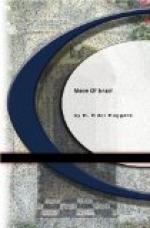Now as I was passing down the Nile with a heart more heavy than the great stone that served as anchor on the barge, we moored at dusk on the third night by the side of a vessel that was sailing up Nile with a strong northerly wind. On board this boat was an officer whom I had known at the Court of Pharaoh Meneptah, travelling to Thebes on duty. This man seemed so much afraid that I asked him if anything weighed upon his mind. Then he took me aside into a palm grove upon the bank, and seating himself on the pole whereby oxen turned a waterwheel, told me that strange things were passing at Tanis.
It seemed that the Hebrew prophets had once more appeared before Pharaoh, who since his accession had left the Israelites in peace, not attacking them with the sword as Meneptah had wished to do, it was thought through fear lest if he did so he should die as Meneptah died. As before, they had put up their prayer that the people of the Hebrews should be suffered to go to worship in the wilderness, and Pharaoh had refused them. Then when he went down to sail upon the river early in the morning of another day, they had met him and one of them struck the water with his rod, and it had turned to blood. Whereon Ki and Kherheb and his company also struck the water with their rods, and it turned to blood. That was six days ago, and now this officer swore to me that the blood was creeping up the Nile, a tale at which I laughed.
“Come then and see,” he said, and led me back to his boat, where all the crew seemed as fearful as he was himself.
He took me forward to a great water jar that stood upon the prow and, behold! it seemed to be full of blood, and in it was a fish dead, and—stinking.
“This water,” said he, “I drew from the Nile with my own hands, not five hours sail to the north. But now we have outsped the blood, which follows after us,” and taking a lamp he held it over the prow of the boat and I saw that all its planks were splashed as though with blood.
“Be advised by me, learned scribe,” he added, “and fill every jar and skin that you can gather with sweet water, lest to-morrow you and your company should go thirsty,” and he laughed a very dreary laugh.
Then we parted without more words, for neither of us knew what to say, and about midnight he sailed on with the wind, taking his chance of grounding on the sandbanks in the darkness.
For my part I did as he bade me, though my rowers who had not spoken with his men, thought that I was mad to load up the barge with so much water.
At the first break of day I gave the order to start. Looking over the side of the barge it seemed to me as though the lights of dawn had fallen from the sky into the Nile whereof the water had become pink-hued. Moreover, this hue, which grew ever deeper, was travelling up stream, not down, against the course of nature, and could not therefore have been caused by red soil washed from the southern lands. The bargemen stared and muttered together. Then one of them, leaning over the side, scooped up water in the hollow of his hand and drew some into his mouth, only to spit it out again with a cry of fear.




